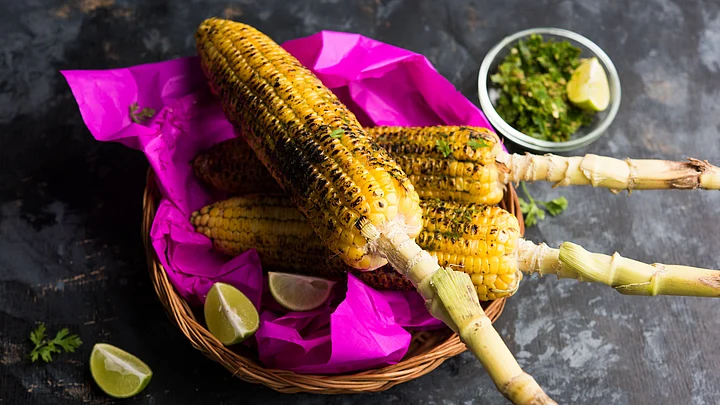Rainy season is tricky. Due to humidity, excessive water loss due to sweating and general irritability (due to humid weather) our body does not function at its prime, and digestion, too, tends to get a little sluggish.
Plus we tend to eat more of the comfort foods (like fried bhajias, jalebis, samosas) which increase chances of abdominal discomfort and dyspepsia (indigestion or upset stomach).
In addition, we also need to contend with lethargy, dehydration and bloating (yes, both) and the omnipresent risk of gastro-infections.
This season demands and deserves very careful eating as during these wet months, our immunity too drops is at an all time low too.
Food that you eat can help a lot. So add these six foods to your diet for these damp months ASAP.
Makhana
Why? To boost the antioxidant counts
These humble seeds are an antioxidant powerhouse. They pack in lots of antioxidants, the most prominent of which is kaempferol (also found in tea, coffee, broccoli, bell pepper, cabbage), which is known to prevent inflammation and thus help keep infections and diseases at a bay.
Besides monsoon season is when you want to most definitely chomp a crunchy snack in the evening, preferably with a steaming cuppa of chai or coffee—the usual suspects are namkeens, pop corns, chips, and pakoras.
Crunchy, delicious makhanas can help circumvent those damaging foods.
Bitter Gourd
Why? To keep infections away
This gourd is a known immunomodulator that is it helps to enhance our immunity thus protecting us against seasonal flu, and as it has blood-purifying properties it helps keep infections at bay too.
Plus it is also good digestive agent and helps in stimulating the secretion of gastric juices
Onions
Why? To score more platelets
Onions (specially when raw) are loaded with a compound called quercetin, which is a known platelet booster.
More platelets in the body is always good news for our immunity that is usually on a low during the monsoon season.
Sprouts
Why? To absorb more nutrients
Sprouts make an ideal snack to nibble on during the monsoons and is a great alternative to the fried, oily options that one might be tempted to eat otherwise. But there is another reason that makes it a rainy season must.
They provide enzymes that the body needs to function properly and keep infections at bay, besides delivering a whooping amounts of immune boosting nutrients like folate, magnesium, phosphorus, and vitamin K.
Ginger
Why? To keep lethargy at bay
Ginger improves the body's digestion capability, which helps keep the energy levels up. It also improves assimilation and transportation of nutrients to the body's tissues, which leads to better functioning of the immune system.
Raw Mangoes
Why? To keep the gastro problems in check
They are rich in vitamin C and B, which helps boost the immune system, much needed to keep seasonal illness at bay. Plus green mangoes are also beneficial in the prevention and treatment of gastro-intestinal disorders like diarrhoea, dysentery, piles, chronic dyspepsia, indigestion and constipation, all of which are rampant during monsoons
Fresh Mint and Coriander
Why? To prevent bloating
Water retention is a common problem during the rainy season and both these greens are fabulous diuretics, besides being natural decongestants
Corn
Why? To boost the digestion
There is a reason why corn is in season during the monsoons as it delivers a lot of fibre, which keeps our digestion humming along nicely.
Even when the digestion gets a little sluggish during the rains. Corn does so much good for our gut, thanks to its high ratio of insoluble-to-soluble fibre.
Turmeric
Why? To keep flu away
Turmeric thanks to the cur cumin in it is a potent immunity booster and inflammation cutter. It can help protect you from sore throat, flu, cough and cold.
Bajra (pearl millet)
Why? To prevent constipation
Digestion gets a little sluggish during the rainy reason so it helps to stick to high fibre, gluten free foods like bajra. In fact it delivers a lot of insoluble fibre that provides bulk to the stool and keeps constipation, a common problem during rains at bay.
Raw Bananas
Why? To keep appetite in check
They are very high in a kind of fibre called Resistant Starch (RS). The short-chain fatty acids produced by the fermentation of resistant starch in the intestines not just keeps one full for longer. Plus they are a good source of vitamin B6, vitamin C, and potassium, all needed in good amounts during these disease ridden months.
(Kavita is a nutritionist, weight management consultant and health writer based in Delhi. She is the author of Don’t Diet! 50 Habits of Thin People (Jaico), Ultimate Grandmother Hacks: 50 Kickass Traditional Habits for a Fitter You (Rupa) and Fix it with foods.)
(At The Quint, we question everything. Play an active role in shaping our journalism by becoming a member today.)
